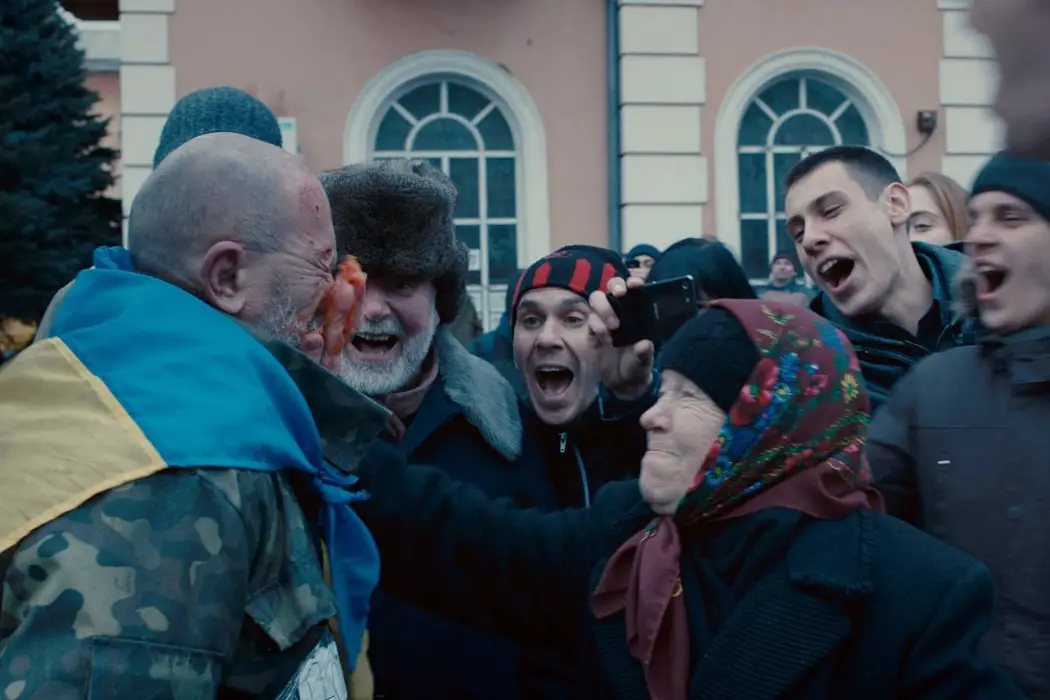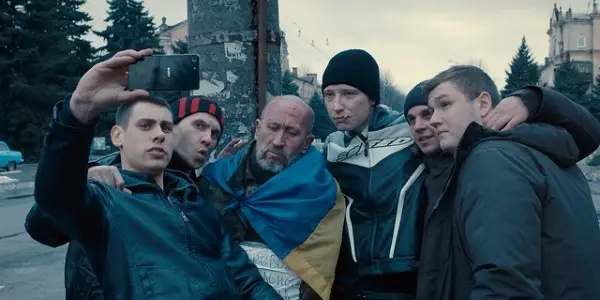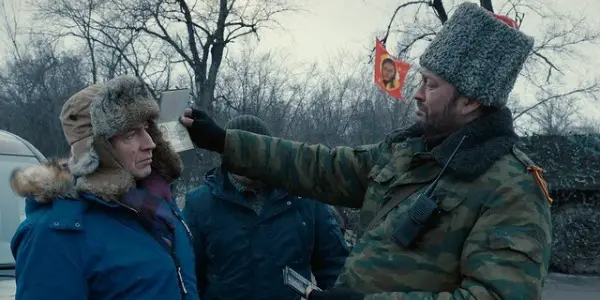DONBASS: Dark Laughs On The Ukrainian Frontline

Alistair is a 25 year old writer based in Cambridge.…
Belarusian director Sergei Loznitsa has quietly become one of the most prolific filmmakers working, crafting out countless documentaries and feature films that analyse the destabilising effects of Russian nationalism and foreign policy under Putin’s rule – reaching back into the events of the Soviet past to show the parallels to the Eastern Europe of the present. But that clash between past and present has never been as pronounced as in Donbass, which takes us into the dark heart of the occupied region, and finds an incomprehensible geo-political conflict has been sold to citizens as the age old battle against the “fascists” on the opposing side.
The Culture War Becomes a Reality
An incisive knowledge of foreign warfare and the very nature of the conflict between Russia and Ukraine isn’t necessary. Through 13 vignettes, Loznitsa takes us from the frontlines to the bomb shelters and everywhere in-between, introducing us to an absurd battle nobody can understand outside of good vs evil platitudes, the depiction of a war fought as much through propaganda as actual conflict proving worryingly easy to grasp in a time when politicians throughout the western world are eager to heighten a “culture war” of opposing ideologies.
Loznitsa’s approach, pitched somewhere between the oddball deadpan comedy of Roy Andersson and the realist grit of Paul Greengrass, feels all the more resonant away from the frontlines by depicting the natural conclusion of such an aggressively nationalistic form of politics. It’d be funny if it didn’t seem so believable that we could easily find ourselves down the same path.
I wasn’t particularly fond of Loznitsa’s previous narrative film, 2017’s A Gentle Creature, despite its similar satirical target; it aimed to look at the suffocating bureaucracy of Putin’s Russia, but ended up a mean spirited punching down at the rural citizens brainwashed by the nationalist propaganda of the media. Donbass corrects this approach considerably, using each vignette to articulate how “fake news” becomes gospel, conflicting reports accelerating to a form of bastardised truth when an unthinkable conflict has taken hold and left many grappling with their sanity in order to find a reason for it. The film is bookended by two sequences set behind the scenes of a fake news broadcast, actors having makeup applied so they appear like victims of war to the wider world – but within the region itself, the truth is still harder to reveal.

As is the case with all films based on vignettes, not every sequence hits its target, although only one (a misfiring wedding sequence between devout supporters of the Donetsk People’s Republic, the closest he gets to reviving the punch-down mentality of A Gentle Creature) requires any prior research on the conflict to ascertain its specific meaning. This is because the director pummels the audience with a visceral unease, forcing us to become spectators in a world gone mad that feels eerily tangible; where the threat of being labelled a fascist with no evidence could lead you to be tied to a lamppost and beaten, or forced to give your car and life savings to separatist fighters for unclear purposes.
This latter sequence, a moment of jet-black comedy that spirals without losing its deadpan edge, is arguably the standout scene, and the one that perfectly orchestrates what Loznitsa was aiming for: demonstrating how regular citizens can find themselves ingrained into a conflict for no rational purpose. If A Gentle Creature showcased a hideous caricature of a nation where everybody is a monster, then Donbass is a great analysis of how that came to be – where the catastrophic effects of war on a nation are merely an after-effect of forcing people to choose sides in a battle they have no investment in.
Thoroughly Researched – but not entirely unproblematic
Shaun Walker, the Eastern Europe correspondent for The Guardian, wrote an analysis of Donbass for the paper. Walker was stationed in the region for months during the height of the conflict, and witnessed the real life inspiration for many of the vignettes first hand, recognising the dark similarities even if they are loose adaptations of headlines. He wrote; “watching the film, I felt many of the scenes had been transposed directly from my memory bank on to the screen, particularly one episode in which dishevelled irregulars harass a foreign journalist, alternately abusing him and telling him to “write the truth”, an almost-daily ordeal while covering the conflict.” Coming from a predominantly documentarian background, it’s no surprise that Donbass is extensively researched down to its minutiae, feeling tangible even at its most surreal; the future of conflict as imagined by George Orwell becoming a reality in the most grim fashion.

Walker does have concerns about the film’s final sequence, a depiction of a war crime that has no similar basis in reality, a reservation so big as to undo any previous goodwill he had towards the film, concluding that “it’s not entirely different from the numerous propaganda films about the war made for Russian state television, even if the Russian attempts are far more crudely distorted and made with markedly less cinematic talent.” And while it is inescapable that a film on the opposing ideological side would also come across as propaganda for a rival cause, for a documentarian to be accused of having a clear agenda when adapting this material is not an unwarranted criticism.
Additionally, by depicting only a handful of incidents via vignettes, Loznitsa highlights the absurdism without cutting through to the human cost of the conflict, both on the battlefield and beyond. He’s holding a mirror up to the surreality of the war, without ever focusing on the specific human cost beyond the surface; it feels well researched and packs a punch, but like A Gentle Creature, often relies on simplifying its material to avoid having to look deeper into characterisation beyond the caricatured. It doesn’t feel mean spirited, but it does feel reluctant to answer the difficult questions in a way his documentaries have no difficulty addressing.
Donbass: Conclusion
Donbass is the darkest of comedies, showing how wartime mania can fundamentally transform a nation overnight. It often avoids looking at the conflict beyond the surface – but when it’s depicted as viscerally as this, you’ll be left reeling regardless.
Donbass is released in the UK on April 26.
Does content like this matter to you?
Become a Member and support film journalism. Unlock access to all of Film Inquiry`s great articles. Join a community of like-minded readers who are passionate about cinema - get access to our private members Network, give back to independent filmmakers, and more.
Alistair is a 25 year old writer based in Cambridge. He has been writing about film since the start of 2014, and in addition to Film Inquiry, regularly contributes to Gay Essential and The Digital Fix, with additional bylines in Film Stories, the BFI and Vague Visages. Because of his work for Film Inquiry, he is a recognised member of GALECA, the Gay & Lesbian Entertainment Critics' Association.













